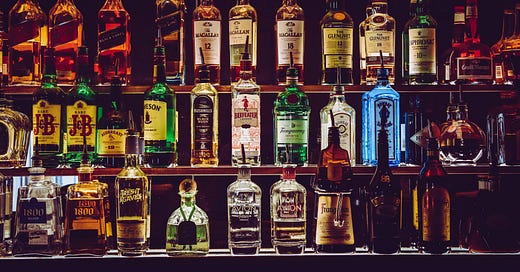Outrage without action is getting us nowhere. It's time to #CancelBigAlcohol / Richie Hardcore
It’s an unprecedented time for the sheer volume of conversations we are having about social justice issues. Social media, public intellectuals, activists and political pundits have spread the good word far and wide, which is brilliant. There are so many problems that need addressing, and we can indeed address them concurrently. At least in some ways, it’s encouraging that it’s now trendy to talk about what’s wrong with the world. It’s so popular to be an activist now, that the world’s biggest brands have begun co-opting the imagery of various political movements, further mainstreaming all manner of anti-oppressive ideas, though at the same time commodifying them. This all leads to a lot of awareness and maybe some degree of education, but I do wonder about what offline, tangible changes this is all creating. We are quick to be offended and outraged but it seems we often ignore what is actually physically hurting our most vulnerable people.
One thing that is glaringly obvious in all this noise, is that there is a noticeable absence of conversations about alcohol as a social issue. Indeed, the same sort of social media accounts that denounce systemic injustices every other day, are quick to promote alcohol sponsored shows and concerts, in between their stories of alcohol-drenched partying or after work wines
It’s beyond frustrating to observe that those who spend their time policing Twitter for wrong-think and spend their days calling out folks for causing emotional harm with microaggressions, seem to place greater emphasis on protecting people’s feelings, than actually pursuing tangible things, like saving people’s lives.
If you’re new to the alcohol debate, here’s a quick recap on what the issue is. Between 600 and 1000 people die each year from alcohol-related causes in New Zealand and alcohol contributes to 3 million deaths a year globally.
The rich and powerful alcohol lobby, internationally and locally, has mobilized against successive Governments for years now. Governments have refused to enact evidence-based policies that would actually protect their citizens from the harm alcohol does. One-third of all criminal offences in New Zealand involved the offender being intoxicated. Alcohol is the single most used drug to facilitate date rape.
1 in 2 Māori men who drink and 1 in 3 Māori women who drink are hazardous drinkers, compared to 1 in 4 non-Māori. Rates of drinking are higher in economically marginalized neighbourhoods. Māori die due to alcohol-related causes at more than twice the rate of other groups; 34 deaths per 100,000 for Māori compared to 14 deaths per 100,000 for non-Māori. This is similar around the world. Indigenous communities that have been colonized are more likely to suffer from alcohol use disorders and alcohol dependence.
So why isn’t this pissing off activists each and every day? Why isn’t there a movement to cancel big alcohol? In a time when social media is rightly bringing people to justice and the thirst for social justice sees even the innocent bystanders losing their jobs and livelihoods when they are caught up in the righteous frenzy, alcohol companies get a free pass.
No one seems to mind or mention that rappers market the liquor brands they own, or celebrities and social media personalities create their own liquor labels to sell to their young fans. Our working-class neighbourhoods have higher concentrations of off-license liquor shops, and there, the booze is cheaper. Marginalized people are victims of predatory store owners and weak local liquor laws, but there is doesn’t seem to be a hashtag highlighting this.
If we really care about helping the dispossessed and the oppressed, we need to make challenging liquor cool. I’m not arguing for mass sobriety, by all means, drink sensibly infrequently, but we need to stop promoting liquor brands and liquor use in our personal lives and advocate politically in solidarity for those that are harmed by big alcohol. We need to support politicians, irrespective of their party, who will stand up to the international alcohol industry. The research is well established about what works to reduce alcohol abuse across the population. We just need to create the public will for politicians to take action and turn the research into law.
Ongoing political advocacy needs to happen for lives to be saved. Support MPs like Chloe Swarbrick who are trying their best to make a legislative change in this uphill battle. Awhi and support groups like Alcohol Action or Alcohol Healthwatch. Share their links, sign their petitions, make the submissions they beg people to send in. If, as a society, we truly care about making a difference and a more equitable world, we need to come together to stand in solidarity to help our most marginalized and preyed upon. Tangible, real-world change is possible, the research is done, the approaches are agreed upon by health experts, we just need the political courage. And for our policymakers to have courage, they need to hear your voice.
‘Richie Hardcore is an educator, public speaker and campaigner who talks about masculinity, mental health, family and sexual violence prevention and substance use. He has a background working in community alcohol and drug harm reduction, and is currently completing a masters thesis in sociology.’




